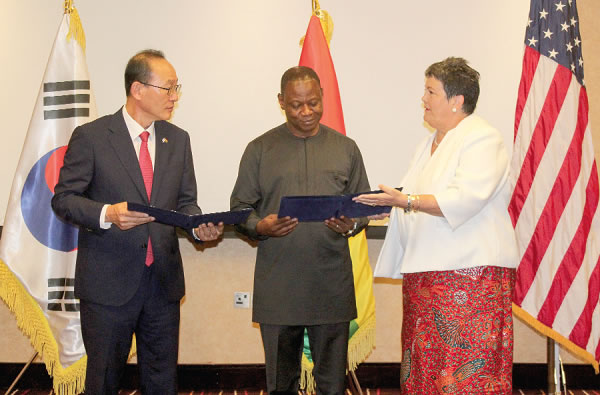
The Korea International Cooperation Agency (KOICA) and the United States Centres for Disease Control and Prevention (US CDC) have launched the second phase of the Global Health Security Agenda Project (GHSA) in Accra.
The launch was commemorated through an exchange of memorandum of Understanding (MoU) between the Ambassador of the Republic of Korea, Park Kyongsig, and the Ambassador of the United States of America, Virginia Palmer, and was witnessed by the Director General of the Ghana Health Service, Dr Patrick Kuma-Aboagye.
Phase II
The GHSA Phase II is a project aimed to improve Ghana’s capacity to prevent, detect and respond to public health threats.
Its implementation started from 2023 and is expected to end in 2027 with $10.85 million funding from the government of the Republic of Korea through KOICA, with technical expertise of the US CDC, Ghana Health Service, University of Ghana School of Public Health and the World Health Organisation (WHO) as the implementing partners.
The project will focus on four core areas including laboratory system, surveillance system, emergency preparedness and response system, and workforce development.
The project seeks to improve the capacity of all Public Health Reference Laboratories, expand the sample referral system, build capacity on Integrated Disease Surveillance and Response and community event-based surveillance, strengthen antimicrobial resistance management, establish five public health emergency operation centres, and build a critical mass of field epidemiologists in all 16 regions of the country.
The GHSA Phase II is a continuation of its Phase I Project ($7.5 million), which was implemented from 2018 to 2023.
The project saw some significant achievements with more than 100 epidemiologists trained from all the 16 regions in Ghana, integration of laboratory information system for routine surveillance, operationalisation of Tamale Infectious Disease Treatment Centre and Emergency Operational Centre in the Volta Region, which contributed to Ghana’s preparedness during the various outbreaks between 2019 to 2023 such as COVID-19, Marburg, mpox, anthrax and polio.
Capacity
Ms Palmer said the importance of the partnerships between the three countries could not be overstated as it helped create a safer world for the global community.
She said the government’s excellent response to the COVID pandemic was a testament to the country’s emergency preparedness, adding that such preparation was key in preventing disease outbreaks in the areas that were recently affected by the spillage of the Akosombo Dam.
Public health
Mr Kyongsig, for his part, said the investment of $10.85 million to Ghana by the Korean government in the next five years represented Korea’s continuous commitment to enhance Ghana’s resilience against public health threats.
“Prior to this project, the Government of the Republic of Korea had already collaborated with the Government of Ghana and the US CDC from 2018 to 2023 to support the strengthening of health security in Ghana and it resulted in an excellent partnership with tangible outcomes,” he said.
Mr Kuma-Aboagye thanked the two countries for their continuous support for the country’s health sector, recalling similar gestures extended to Ghana over the years.
He said Ghana would not stop partnering the two countries to advance health care.











